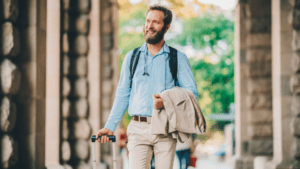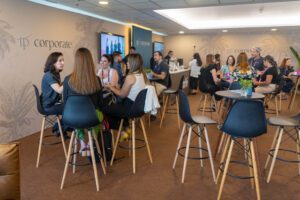With the ongoing vaccination process, borders are gradually opening for Brazilians, allowing us to be in other countries. This is good news for those who need to travel for business.
The Covid-19 pandemic imposed a series of changes and reflections. From sanitary measures to the economy, we are all adapting to new behaviors, understanding the new work dynamics, and how to take care of ourselves. One of the main changes taking place is in the way we travel.
After more than 18 months of the pandemic, with more scientific information on how to behave in the face of the virus and vaccination progressing worldwide, we are beginning to plan the return for travelers. I often say that traveling is a fundamental part of returning to normalcy, even if this normalcy is somewhat different from what we were used to before early 2020.
Mass vaccination, combined with the decline in Covid-related fatalities, is making it possible to reopen international tourism, and some borders have once again become more flexible for us Brazilians.
The option to leave the country for leisure or business is once again real and viable if the traveler follows the safety protocols of each location. As of early September, countries like Switzerland, France, Germany, Portugal, Spain, Belgium, and Finland are open to Brazilians. Canada is expected to reopen on September 7, and Uruguay has announced November 1 as the date for resuming tourism.
The United States remains closed to tourism, but it is possible to apply for an exemption if there’s a need to enter the country for business. The trend is that these restrictions will gradually ease. It is already possible to plan vacations in Monaco, Croatia, or perhaps enjoy some time in the Caribbean.
It seems that the options will continue to increase this year. After all, everyone is missing traveling.
According to data from the Air Navigation Management Center (CGNA), the number of take-offs and landings in Brazil in the first four months of this year grew 23% compared to the same period last year. However, for the trip to go smoothly, it is very important for the traveler to verify the conditions set by each country: in most of those already allowing Brazilian immigration, the traveler must have received the second dose of the required vaccines more than 14 days ago or, in the case of the Janssen vaccine (single dose), more than 28 days ago. Another point of attention is that each country has its own criteria for accepting vaccines. Vaccines approved by organizations such as the World Health Organization (WHO) or the European Medicines Agency (EMA) are not always enough to enter certain countries.
Checking this information, which is constantly changing, is essential for a successful trip. For leisure tourism, this planning helps avoid headaches and frustrations. But when it comes to business travel, we’re talking about the risk of wasting time and creating frustrations for executives and consultants, not to mention the real possibility of seeing negotiations fail due to lack of planning. What was once done by the assistants of these professionals, armed with apps from airlines and hotels, now requires a structure capable of ensuring that each step taken by these executives abroad is done safely and efficiently.
This is where we come in, essentially ensuring that, from point A to point B, the professional has the best and safest transportation and accommodation options, with predictability and flexibility. And we know these rules inside and out, as well as ensuring that our partners comply with all protocols to provide the best possible experience while traveling.
The Resumption of Events in the Context of Border Reopenings
In this new scenario, the tourism world is adapting, adjusting, and gradually expanding the options for travelers. With the advancement of vaccination and, consequently, the decline in COVID cases, the events market is starting to heat up again, and some countries are already opening their doors to the public.
São Paulo recently allowed the resumption of cultural, social, and corporate fairs. Among them, the much-awaited Formula 1 race at Interlagos in November is expected. In the same month, football stadiums are also expected to reopen to fans, as well as places where standing concerts are held.
For example, Dubai will hold Expo 2020 starting in October and expects many visitors. Almost all of them will bring a new reality compared to the pre-pandemic times: most events, both in Brazil and abroad, now only allow entry to people who can prove that they’ve received two doses of the vaccine (for vaccines that require two doses) and/or a recent negative COVID-19 test.
The Near Future Ahead
During the pandemic, we discovered that, in some cases, remote work and virtual meetings speed up processes and optimize time – and these changes seem here to stay. However, this new corporate behavior, virtual work, has made us overlook an important factor: human care and less bureaucratic interaction between people. As a result, the work environment, although practical, has become colder, which can impact employees’ well-being and the decision-making process.
Virtual improvements have enhanced some processes, but I believe in-person business meetings are indispensable, such as for closing major deals, meeting suppliers and partners, and conducting certain team trainings. Professional relationships that bring the greatest sense of credibility are those where face-to-face interactions, including eye contact and handshakes, remain part of the routine. In the post-pandemic world, human interaction will become fundamental in a world dominated by algorithms, and travel will remain crucial for business health and success. Therefore, the hybrid model, blending both in-person and virtual, is likely to become the standard in the corporate world.
Since international vacations have become an option again, business trips that extend into leisure are also making a comeback. With the rise of digital nomadism, professionals are seeking well-equipped places to work remotely, while also enjoying their free time, providing the traveler with a complete experience for working efficiently while maintaining quality of life during their stay.
A recent study by TRVL LAB/ELO, titled “Travel in a Post-Vaccine World – Insights for Tourism,” shows that Brazilians enjoy traveling for business, but they would like to travel less frequently and with better quality. Planning better with a focus on well-being during the stay and combining purposes like bleisure is the current trend. While the study suggests that the number of trips will decrease (as alternative work modes were learned during the pandemic), the tourism outlook is positive: 84% of respondents said they enjoy business trips, and more than 80% said these trips will be more planned and involve multiple activities, including leisure, which is an excellent outlook for the market and those who travel.
For these reasons, the sector has been discussing and preparing more and more to ensure that the reopening of borders adapts to the new world, bringing benefits to everyone – customers and companies in the industry.






